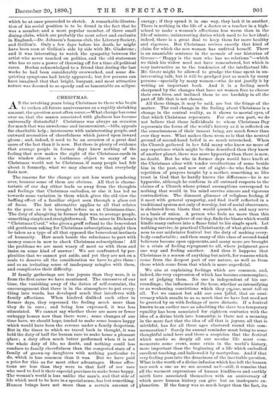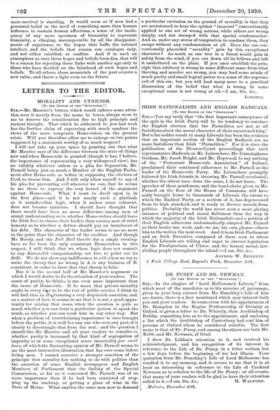CHRISTMAS.
AS the revolving years bring Christmas to those who begin to reckon all future anniversaries as a rapidly shrinking amount, the question must often recur,—What change has come over us, that the season associated with gladness has become universally distasteful ? Christmas was always an occasion for much that was unwelcome and inconvenient,—bills, appeals for charitable help ; intercourse with uninteresting people, and outward necessities of cheerfulness which jarred upon inward gloom ; and, indeed, it used to be an occasion of a great deal more of the last than it is now. But there is plenty of evidence that average people in former days knew nothing of the -feeling that now makes the sight of the Christmas-cards in the window almost a loathsome object to many of us. Christmas would not be Christmas, if many people had felt -about it formerly, what we may almost say that everybody feels now.
The reasons for the change are not less worth pondering -over, because some of them are obvious. All that is charac- teristic of our day either leads us away from the thoughts and feelings that Christmas embodies, or else it has led us towards some variation in them which gives the old view the baffling effect of a familiar object seen through a glass out of focus. The last alternative applies to all that relates to the poor, as it is brought before us at Christmas-time. The duty of almsgiving in former days was, to average people, -something simple and straightforward. The miser in Dickens's " Christmas Carol," who gives a gruff refusal to the benevolent old gentleman asking for Christmas subscriptions, might then • be taken as a type of all that opposed the benevolent instincts of humanity. How much beside the reluctance to part with -money comes in now to check Christmas subscriptions ! All the problems we are most weary of meet us with them and insist on some kind of answer! We are confronted by per- plexities that we cannot put aside, and yet they are not on a scale to deserve all the consideration we have to give them ; and so an irritating sense of inadequacy mingles with them, and complicates their difficulty.
If family gatherings are less joyous than they were, it is from the first cause we have mentioned. The unreserve of our time, the vanishing away of the duties of self-restraint, the encouragement that there is in the atmosphere to put every- thing into words, has developed much that interferes with family affections. When kindred disliked each other in former days, they repressed the feeling much more than -they do in ours ; and being less expressed, it was less -stimulated. We cannot say whether there are more or fewer unhappy homes now than there were; some changes of our -time have, we should hope, tended to make some homes happy -which would have been the reverse under a family despotism. But in the times to which we travel back in thought, it was held the duty of half the human race to make home a pleasant place; a duty often much better performed when it is not the whole duty of life, no doubt, and nothing could less conduce to family cheerfulness than the congested state of a family of grown-up daughters with nothing particular to do, which is less common than it was. But we have paid -a, price for this as for most other advantages. Home affec- tions are less than they were to that half of our race who used to feel it their especial province to make home happy. The woman's world is less unlike the• man's, and that side of life which used to be hers in a special sense, has lost something. Iluman beings have not more than a certain amount of energy ; if they spend it in one way, they lack it in another. There is nothing in the life of a doctor or a teacher in a high- school to make a woman's affections less warm than in the life of minute, uninteresting duties which used to be her ideal; indeed, there is a great deal to keep them far more healthy and vigorous. But Christmas revives exactly that kind of claim for which the new woman has unfitted herself. There is an unamiable sentence in the memoir of our historian of Greece—" Happy is the man who has no relations "—which we think his widow need not have remembered, but which is very instructive as to the tendencies of the intellectual life. Mr. Grote might be allowed to grudge the time spent in un- interesting talk, but it will be grudged just as much by many persons—specially by many women—who do not justify it by writing an important book. And it is a feeling much sharpened by the changes that have set women free to choose their own lives, and inclined them to see hardship in all the part of life that is not chosen.
All these things, it may be said, are but the fringe of the matter. The real change in the feeling about Christmas is a change in the central reality, as it shows to mortal eyes, of that which Christmas represents. For our own part, we do not believe that those individuals to whom Christmas Day represents the focus of the world's history as it is reflected on the consciousness of their inmost being, are much fewer than ever they were. What makes them seem so is that the neutral ground of second-hand belief is so much retrenched. When the Church gathered in her fold many who knew no more of any experience which might be thus described than they knew of another planet, there was more hypocrisy than there is now, no doubt. But he who in former days would have knelt at the Christmas altar with tender recollections of some beside him in the past, and now out of sight—he who feels in the repetition of prayers taught by a mother, something so like trust in God that he hardly knows the difference—he is no hypocrite, although he conform in all outward respects to the claims of a Church whose primal assumptions correspond to nothing that would in his mind survive sincere and vigorous contradiction. The dimmest glimmer of religious feeling, if it meet with general sympathy, and find itself reflected in a traditional system not only of worship, but of social observance, is sheltered from blasts that would quench it, and may serve as a basis of union. A person who feels no more than this living in the atmosphere of our day, finds the blasts which would kindle many embers into a flame fatal to his single spark. Let nothing survive, in practical Christianity, of what gives sacred- ness to our midwinter festival but the duty of making every- body comfortable ; and then many of this class of second-band believers become open opponents, and many more are brought to a crisis of feeling repugnant to all, where judgment goes one way and feeling another. And thus it happens that Christmas is a season of anything but mirth, for reasons which come from the deepest part of our nature, as well as from those which come from that which is more superficial.
We aim at explaining feelings which are common, and, indeed, the very expression of which has become commonplace, not at judging them. No one is independent of his sur- roundings ; the influences of the hour, whether as intensifying
or as weakening convictions which they ose, must tell on all. Yet we cannot but add our own 5eref, that an anni- versary which recalls to us so much that we have lost need not be greeted by us with feelings of mere distaste. If a festival known to an earlier race as admitting the slave to a temporary equality has been associated for eighteen centuries with the idea of a divine birth into humanity, is there not a meaning in the mere fact that the idea of all that is joyous, all that is mirthful, has for all these ages clustered round this com- memoration ? Surely its annual reminder must bring to some thoughtful mind here and there a suspicion that the festival which marks so deeply all our secular life must com- memorate some event, some crisis in the world's history, more important than the beginning of a life which embodied excellent teaching, and hallowed it by martyrdom. And if that very feeling pass into the dreariness of the inevitable question, What is the worth of a divine infusion which has left the human race such a one as we see around us ?—still, it remains that all the warmest expressions of human kindliness and earthly mirth have associated themselves with an anniversary of which mere human history can give but an inadequate ex- planation. If the fancy was so much larger than the fact, its
mere survival is startling. It would seem as if men had a perennial belief in the need of something more than human influence to sustain human affections, a sense of the inade- quacy of any mere specimen of humanity to represent humanity, a clinging, unconquerable by all the disappoint- ments of experience, to the hopes that baffle the rational intellect, and the beliefs that reason can catalogue only, and not either establish or confute. And if in such an atmosphere as ours these hopes and beliefs burn dim, that will be a reason for rejecting these links with another age only to those who have decided on the falsehood of such hopes and beliefs. To all others, these memorials of the past acquire a new value, and throw a light even on the future.











































 Previous page
Previous page